新概念英语第一册lesson 71课件
新概念英语NCE1_lesson73-74课件
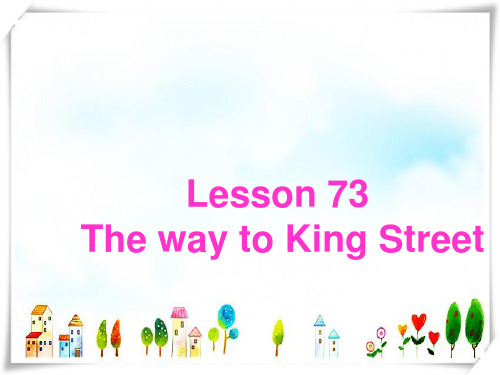
8. Excuse me. 打扰一下,请问…(事前) I’m sorry. 对不起,很抱歉(事后)
9.tell sb. the way to, 告诉某人去……的路。
问路: How can I get to...? Where is ...?
The man smiled pleasantly.
He did not understand English!
时态 一般现 在时
一般过 去时
用法 动词 肯定句 否定句 形式
一般、 原形/ I do… I don’t
经常、 三单 He
do…
习惯、 do/do does… He
真理 es
doesn
’t
do …
过去 某一 时
间做 了某 事
过去 式
did
I did…
HeHe didn’t do…
注:直接引用说话者的话叫做直接引语
5. see:看见,强调结果,see sth. look:看,强调动作,look at sth. hear-listen find-look for
6. ask sb. sth. 问某人某事。 eg:He asked the teacher a question.
do
He spoke German. He was a tourist.
speak
is
Then he put his hand into pocket, put
and took out a phrasebook. take
put… into… 把…放进…中 take…out of… 把…从…中取出
一般疑问 句及其回 答
特殊疑问 句及其回 答
Do you What do like milk? you like?
新概念英语71课单词

新概念英语71课单词新概念英语第71课的单词包括:
1. Prosperous.
2. Unemployment.
3. Inflation.
4. Deflation.
5. Recession.
6. Recovery.
7. Economic.
8. Downturn.
9. Boom.
10. Slump.
"Prosperous" 意为“繁荣的”,"Unemployment" 意为“失业”,"Inflation" 意为“通货膨胀”,"Deflation" 意为“通货紧缩”,"Recession" 意为“经济衰退”,"Recovery" 意为“复苏”,"Economic" 意为“经济的”,"Downturn" 意为“衰退”,"Boom" 意为“繁荣”,"Slump" 意为“暴跌”。
这些单词是与经济和金融相关的,掌握它们可以帮助我们更好地理解和讨论与经济相关的话题。
在学习这些单词时,可以结合实际情境进行练习,例如阅读相关的经济新闻或文章,以加深对这些单词的理解和记忆。
同时,也可以通过与他人讨论经济话题的方式来运用这些单词,从而加深记忆。
希望这些单词对你的学习有所帮助。
新概念英语第一册第71课一般过去时
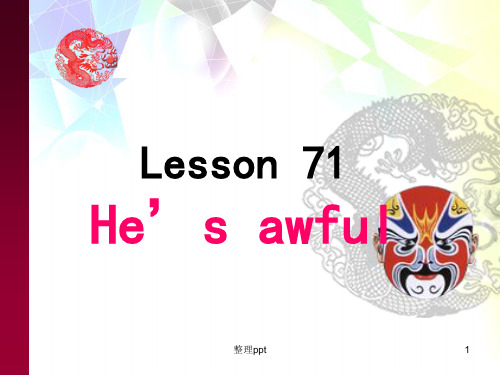
• 3. 以“辅音字母+y”结尾,变y为i加ed
• stop plan
• 4. 以“辅音+元音+辅音”辅元辅结尾,双写最后
的辅音加ed
整理ppt
25
一般过去时的标志性时间状语
yesterday短语, yesterday morning/afternoon/evening
last短语 last night/Monday/week/month/year,
★awful awfully
•
adj. 让人讨厌的,坏的 adv. 非常(在表示负面的情景中,可用
awfully代替very)
I am awfully(very) sorry.
整理ppt
3
• time n.
• ①次(数)C
• once
• twice
• 3 times ≥3 数词+times
• ② 时间 U
What did you sing together yesterday?
整理ppt
7
他们昨天晚上给我打电话了。
They telephoned me last night. They didn't telephone me last night. Did they telephone you last night? Yes,they did. No, they didn't. What did they do last night?
speak with sb (spoke) Can I speak with you for a minute?
整理ppt
16
整理ppt
17
整理ppt
18
新概念英语第一册71-72

练习一:
1. can he ____a story in English? A. tell B. speak C. say D. talk 2. The teacher _____ us to finish the homework in time. A. tells B. speaks C. says D. talks 3.What would you like to ______ us about you hometown. A. speak B. talk C. say D. tell
二、 用所给词的适当形式填空。
came 1. Tom and Mary ___________ (come) to China last month. 2. Mike _________________(not go) to bed until 12 o'clock didn't go last night. So he ______ got (get) up late. read 3. Mary __________ (read) English yesterday morning. began 4. Tom ___________ (begin) to learn Chinese last year. 5. My mother ________________ (not do) housework didn't do yesterday. was 6. There ____________ a telephone call for you just now. (be) 7. -When did _______ you _________ (come) to china? come Last year. Was 8. _________ (be) it cold in your city yesterday? were 9. How many people ________ (be) there in your class last term? 10. There ________ (be) a football match on TV yesterday was evening, but I _________ (have) no time to watch it. had
新概念英语第一册课件LessonPPT完整版

新概念英语第一册课件Lesson121-122 (共45张PPT)
新概念英语第一册课件Lesson121-122 (共45张PPT)
serve v. 照应,服务,接待
❖ custom 风俗 ❖ customs 海关 ❖ 有顾客customer的地方,肯定就有 shop
assistant /waiter/waitress ❖ guest 旅馆的旅客 ❖ passenger 乘客
新概念英语第一册课件Lesson121-122 (共45张PPT)
Hale Waihona Puke 新概念英语第一册课件Lesson121-122 (共45张PPT)
三、课文经典句回放。 1. 他们进到屋里后,走进了饭厅。 After they had __e_n_t_e_re_d___ the ___h_o_u_s_e___, they went ___i_n_t_o____ the ___d_i_n_n_in_g__ ____r_o_o_m___. 2. 小偷扔下了手电筒,飞快地逃走了。 The __t_h_i_e_v_es___ dropped the ___t_o_r_c_h___ and ran away as ___q_u_ic_k_l_y__ as they could. 3. 是一年前发生在我的一个朋友身上的故事。 It _h_a_p_p_e_n_e_d__ to a ___fr_i_e_n_d___ of mine a ___y_e_a_r__ ago.
n. 顾客 v. 忘记 n. 经理 v. 照应,服务,
接待 n. 柜台 v. 认出
新概念英语第一册第67-68课课件(共41张PPT)
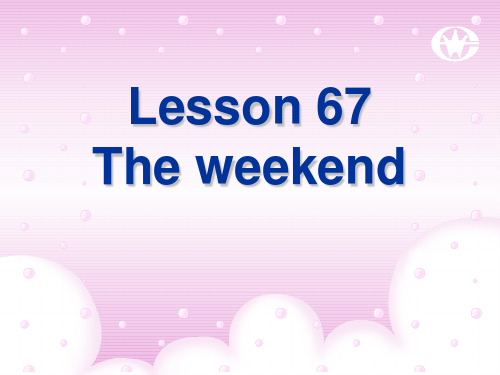
Aren't you lucky! ✲ 这句话是否定疑问句形式的感叹句,为的是加强语气。 尽管形式上是否定的,但却表示强有力的肯定。
Grammar
语法
一般过去时(simple past tense) :
过去发生的而现在已经结束的动作要用一般过去时。
基本用法:
1、常用来表示过去某一时间所发生的非持续性动作;
Lesson 67 The weekend
Discussion
What did you do on weekend ?
New Words
greengrocer 蔬菜水果零售商
absent
缺席的
keep
处于、保持
spend
度过
weekend 周末
country
乡村、国家
lucky
幸运的
New Words
5、We played(play的过去式) computer games together. 我们在一起玩了电脑游戏。
6、It ran(run的过去式) after a cat yesterday. 它昨天跑着追赶一只猫。
7、They made(make的过去式) a bookcase for Jim. 他们为Jim做了一个书架。
⑥Miss Zhang was ill 2 days ago. 张小姐前两天病了。
Miss Zhang wasn’t ill 2 days ago. 张小姐前两天没有生病。
一般过去时的句型构成形式:
一、含有系动词(be动词——am/is/are)的一般过去时形式:
✿疑问句: Was /Were + 主语 + …?
新概念英语第一册Lesson71~76课后答案
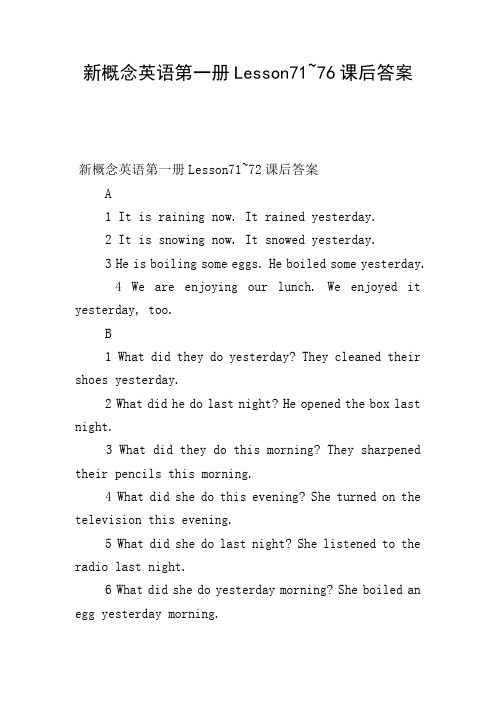
新概念英语第一册Lesson71~76课后答案新概念英语第一册Lesson71~72课后答案A1 It is raining now. It rained yesterday.2 It is snowing now. It snowed yesterday.3 He is boiling some eggs. He boiled some yesterday.4 We are enjoying our lunch. We enjoyed it yesterday, too.B1 What did they do yesterday? They cleaned their shoes yesterday.2 What did he do last night? He opened the box last night.3 What did they do this morning? They sharpened their pencils this morning.4 What did she do this evening? She turned on the television this evening.5 What did she do last night? She listened to the radio last night.6 What did she do yesterday morning? She boiled an egg yesterday morning.7 What did they do yesterday afternoon? They playeda game yesterday afternoon.8 What did he do in the morning the day before yesterday? He stayed in bed in the morning the day before yesterday.9 What did she do yesterday evening? She telephoned her husband yesterday evening.10 What did she do the night before last? She called the doctor the night before last.新概念英语第一册Lesson73~74课后答案A1 He read the phrase slowly.2 He worked lazily.3 He cut himself badly.4 He worked carefully.5 The door opened suddenly.B1 He does not know me very well.2 She worked very hard.3 She smiled pleasantly.4 The bus went hurriedly.5 He shaved slowly.6 She drank a glass of water thirstily.7 He greeted me warmly.8 We enjoyed ourselves very much.新概念英语第一册Lesson75~76课后答案A1 She met her friends yesterday.2 They drank some milk yesterday.3 He swam in the river yesterday.4 She took him to school yesterday.5 He cut himself yesterday.B1 When did you walk across the park? I walked across the park last week.2 When did you wash your hands? I washed my handsa minute ago.3 When did you work in an office? I worked in an office the year before last.4 When did you ask a question? I asked a question five minutes ago.5 When did you type those letters? I typed those letters a month ago.6 When did you watch television? I watched television every day this week.7 When did you talk to the shop assistant? I talked to the shop assistant last month.8 When did you thank your father? I thanked myfather an hour ago.9 When did you dust the cupboard? I dusted the cupboard three days ago.10 When did you paint that bookcase? I painted that bookcase the year before last.11 When did you want a car like that one? I wanteda car like that one a year ago.12 When did you greet her? I greeted her a minute ago.。
NCE1_Lesson107-108(共45页)新概念英语第1册课件

Key words and expressions
•
★madam(对妇女的尊称名词)夫人,女士 服务行业的人员常用此称呼;同时,对于不 知姓名的女士也可以用此来表示尊重。这个 单词也可拼作ma'am [mæm]. Do you like this dress,madam? What can I do for you,madam?
Let’s review—A card from Jimmy
• • • • • • • • • --Read Jimmy's card to me please, Penny. --I have just arrived in Scotland and I'm staying at a Youth Hostel.’ --Eh? --He says he's just arrived in Scotland. He says he's staying at a Youth Hostel. You know he's a member of the Y.H.A. --The what? --The Y.H.A., Mum. The Youth Hostels Association.
• --What's it?
• --It's a dictionary. I hope it'll help you.
Key words and expressions
• • • • • madam n. 夫人,女士 smart adj. 漂亮的 as well 同样 suit v. 适于 pretty adj. 漂亮的
Key words and expressions
★pretty (形容词)漂亮的
新概念英语第一册Lesson77-78课件

模仿例句回答以下问题,注意时间状语的变化 eg: It’s eight o’clock. When did you see him?
(half an hour ago) I saw him at half past seven. It’s Friday. When did she go to London? (the day before yesterday) She went to London on Wednesday. It’s June. When did Mr Jones buy that car? (last month) He bought that car in May.
Can 't you come at 2 a.m.?
Are n't you a boy?
Did n't you do your homework?
步
先变
be/助/情
骤
一般疑问句
后加not
1. I can play football. Can you play football?
Can't you play football?
She went to town yesterday. 1. She buys a new car every day.
She _b_o_u_g_h_t a new car last year. 2. She airs the room every day.
She _a_i_re_d__ it this morning.
NURSE: Do you _h__a_v_e_a__n__a_p_p_o_i_n_t_m__e_n_t__? MR. CROFT: No, I don’t. 有一个预约
新概念英语第一册课件 NCE1 Lesson 77-78
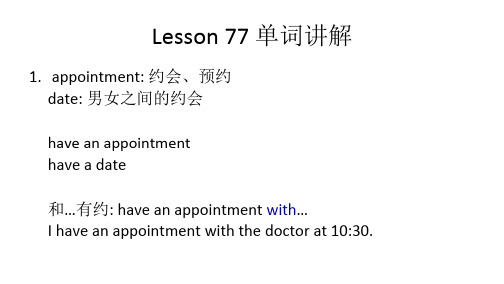
Lesson 77 单词讲解1.appointment: 约会、预约date: 男女之间的约会have an appointmenthave a date和…有约: have an appointment with…I have an appointment with the doctor at 10:30.2.urgent: 紧急的、紧迫的急事— urgent businessurgent to do: 坚持要His father is urgent to get a girlfriend for him.His mother is urgent to arrange a blind date.3.till: 直到…为止I waited till 10: 30.Never put off till tomorrow.Lesson 77 课文讲解1.terrible\bad toothache2.I want to see…want + n.want + to doI want a new car.I want to buy a new car.3.Do you have an appointment?have a headacheDo you have a headache?have a coldDid you have a cold?have a blind dateDid you have a blind date?4.Can you come at 10 a.m. on Monday, April 24th?A.a.m.: in the morningp.m.: in the afternoon凌晨5点:5 a.m.深夜11点:11p.m.B.4月24日,星期一,上午10点10 a.m. Monday, Apr. 24that 10 a.m., on Monday, on Apr. 24th5.I’m afraid that .I’m sorry .6.C an’t you wait till this afternoon?否定疑问句——难道你就不能等到今天下午吗?Lesson 77 语法讲解否定疑问句:1.构成:一般疑问句的疑问词+not 的缩略式Are you ok?Do you know that? Can you wait? Aren’t Don’t Can’t2.何时用?A.表达强调Aren’t you lucky!B.表达情绪Don’t you love me?3.翻译:“难道,难道不…”4.组织步骤:一般疑问句(先看词性,再看人称)+ not难道她不漂亮吗?Is she beautiful?I sn’t she beautiful?难道她没有男朋友吗?Does she have a boyfriend?D oesn’t she have a boyfriend?难道你昨天没去约会?Did you have a date yesterday?D idn’t you have a date yesterday? 难道你就不能温柔一点吗?Can you be tender?C an’t you be tender?日期的表达方式:first ,1st sixth,6th second,2ndseventh,7ththird,3rdeighth,8thforth,4thninth, 9thfifth,5thtenth,10thJan. 1st Feb. 2nd Mar. 3rd Apr. 4th May 5th日期的表达方式:twenty-third,23rdJan. 21st Feb. 22nd Mar. 23rd Apr. 31th …twenty-first ,21st twenty-second,22nd tewnty-forth,24thtwenty-fifth,25th…thirty-first,31st …Lesson 77&78 知识拓展(学生版)movie film pantstrouserssoccerfootballvocation subway zipper遇到视频知识点错服务QQ317032如 无法h 正o 常l 播i 放d ,a 课y 件错误,误等u 课n 程d 问题e ,rg 可以reraserrubbersidewalksneakers trainersstove cookertruck lorrypavem ent fries chips1.-Do you know that Henry didn’t win the match?- _? I thought he would. He worked so hard on it (呼和浩特中考题)A.Do IB.Don’t IC.Did heD.Di√dn’t he2.-Don’t you think Mr. Zhang is a popular teacher?- _ _. (山西大同中考题)A. Yes, I don’t.B. No, I don’t.C.No,he is.D.Y√es,he isn’t.。
新概念英语第一册第107-108课课件(共31张PPT)
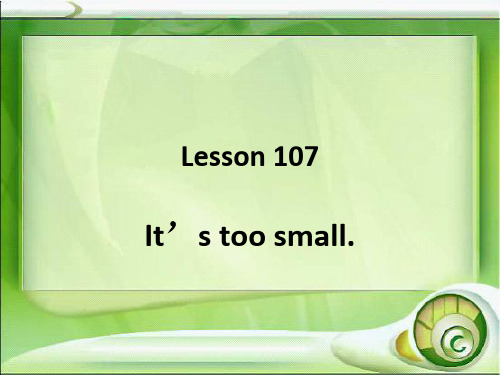
Could you show me another blue dress? Could you…用于表示请求。比can you 语气婉转,更 为客气。 你能告诉我去火车站的路吗? Could you tell me the way to the station? show sb sth /show sth to sb给某人出示某物 请给我看一下你的护照。 Show your passport to me please! another 另一个 我想再喝一杯茶 I want to have another cup of tea.
翻译句子
这个包看起来很漂亮。 我喜欢比较大的那个书架。 恐怕这件衣服的颜色不适合我。 我觉得那条裤子更大。 你能给我看看那个手机吗? 他的家比我家漂亮多了。 这家商店是镇里最大的一家。 我的家太大了,不好收拾。 活太多了,我干不完了。 这件礼物适合十岁的女孩子
★suit ① v. 适合;适宜于 This coat suits me. This coat doesn’t suit me at all. ② v. 相称,相当,合某人之意 The climate here suits me very well. 这里的期候非常适合我。 Blue suits her. 蓝色与她相配。
6.不规则变化 --good/well—better—best --bad/ill—worse—worst --many/much—more—most --little/few—less—least
用法
1. 比较级只用于两者之间 常用于‘比较级+than’结构中。 他比我胖 He is fatter than I. 2.最高级常用于“the+最高级+比较范围”结构 她是这个班里最好的学生。 She is the best student in the class. 他在这个班唱歌最好。 He sings (the)best in the class. 形容词最高级加the,副词最高级常可省去the.
新概念英语第一册73-74课课件

What happened to her? (Did she lose her way?)
She lost her way.
Where did she see a man?
She saw a man near a bus stop.
What did she say to him?
She said, ’Excuse me .Can you tell me the way to King Street ,please?’
Example:
She
smiled ______ . (pleasant) She smiled pleasantly. Complete these sentences.
形容词变副词
1.一般情况下在形容词词尾直接加-ly。 如:real-really; helpful-helpfully; careful-carefully; hopeful-hopefully; slow-slowly; quick-quickly; quiet-quietly ;quick---quickly
一般过 过去 去时 某一 时 间做 了某 事 过去 式 did
I don‟t do… He doesn‟t do … I did… I didn‟t Did you What did do… drink milk? you He did… He Yes, I did. drink? didn‟t I drank do… milk.
★week n. 周 this week, last week等,前面不 能加介词 the week before last 上上周 the week after next 下下周
★suddenly 既可以放在句首,也可以放在句中或句 末。 I suddenly remembered that I didn't bring my key.
新概念英语第一册课后题及答案:Lesson71-72
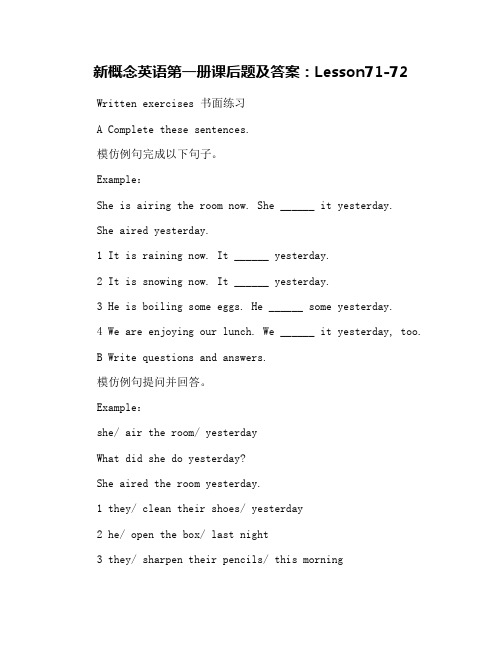
新概念英语第一册课后题及答案:Lesson71-72 Written exercises 书面练习A Complete these sentences.模仿例句完成以下句子。
Example:She is airing the room now. She ______ it yesterday.She aired yesterday.1 It is raining now. It ______ yesterday.2 It is snowing now. It ______ yesterday.3 He is boiling some eggs. He ______ some yesterday.4 We are enjoying our lunch. We ______ it yesterday, too.B Write questions and answers.模仿例句提问并回答。
Example:she/ air the room/ yesterdayWhat did she do yesterday?She aired the room yesterday.1 they/ clean their shoes/ yesterday2 he/ open the box/ last night3 they/ sharpen their pencils/ this morning4 she /turn on the television/this evening5 she/listen to the radio/ last night6 she/boil an egg/ yesterday morning7 they/ play a game/ yesterday afternoon8 he/ stay in bed/ the day before yesterday/ in the morning9 she/ telephone her husband/ yesterday evening10 she/call the doctor/the night before last答案:Lesson 72A1 It is raining now. It rained yesterday.2 It is snowing now. It snowed yesterday.3 He is boiling some eggs. He boiled some yesterday.4 We are enjoying our lunch. We enjoyed it yesterday, too.B1 What did they do yesterday? They cleaned their shoes yesterday.2 What did he do last night? He opened the box last night.3 What did they do this morning? They sharpened their pencils this morning.4 What did she do this evening? She turned on the television this evening.5 What did she do last night? She listened to the radio last night.6 What did she do yesterday morning? She boiled an egg yesterday morning.7 What did they do yesterday afternoon? They played a game yesterday afternoon.8 What did he do in the morning the day before yesterday? He stayed in bed in the morning the day before yesterday.9 What did she do yesterday evening? She telephoned her husband yesterday evening.10 What did she do the night before last? She called the doctor the night before last.。
最新2019-新概念英语第一册-Lesson75-76(共37张PPT)-PPT课件

ago
A week
A month
A year
17
课文讲解
Two minutes
Five hours
Three days
ago
Two weeks
Four months
Six years
18
课文讲解
4. pair n. 双,对
a pair of (看作单数)
15
课文讲解
3. ago adv. 以前
ago 用于一般过去时;
I went to London three days ago. 我三天前去的伦敦。
She left thirty minutes ago. 她30分钟前离开的。
16
课文讲解
A minute
An hour
A day
但有时动词后面的宾语不是一个词,而是由 一个句子来充当宾语,就是宾语从句。
22
宾语从句跟在两类词后:
1. ★表示人的情感或心理活动的形容词 afraid/ sure/ sorry/ glad
主语+ be+ adj. + that+ 宾语从句
did saw lost said swam understood spoke took read found gave cut
复习一般过去时
今天早晨他匆忙刮脸. He shaved hurriedly this morning. 他很渴地喝水. He drank thirstily. 他热情地跟我打招呼. He greeted me warmly.
7
课文讲解 Listen to the tape and answer the
新概念英语第一册第71课课件NCE1lesson71

again 再次,又一次 but 表示转折 telephone的缩写:phone
Lesson 71 He’s awful!
Did he telephone again last night? Yes, he did.
did是do的过去式,过去式变一般疑 问句时用did做助动词。 last night 昨晚,前一晚 last morning 昨天早上 last evening 昨天晚上
He’s awful. be awful 让人讨厌的,厌恶的 = make sb. sick
Gegewu is awful. Gegewu makes me sick.
Lesson 71 He’s awful!
He telephoned me four times yesterday, three times the day before yesterday.
Lesson 71 He’s awful!
What’s Ron Marston like, Pauline?
What is … like? 。。。怎么样? What’s the weather like? 天气怎么样? What’s Tom like? Tom人怎么样?
Lesson 71 He’s awful!
Lesson 71-72
Ellie 2012-11-29
Are you ready?
Review Words 听力 课文 练习 总结
Review
Review
一般过去时 句子结构 否定句 一般疑问句 否定疑问句 缺席 在某地 成百上千 介词in/ at/ on
answer the telephone 接电话 answer的过去式 answered
新概念英语NCE1_lesson71-72(共13页)课件

• Yes, he did.
• He telephoned (telephone的适当形式) at nine o'clock.
• What did (do的适当形式) you say to him?
您身边的小升初英语专家----鑫鹏学校新概念部
课文再现-英汉互译
• He‘s awful!
• Then I arrived home at six o'clock
• 他讨厌透了!
• What's Ron Marston like, Pauline? • 朗·马斯顿是怎样一个人?
• He telephoned me four times yesterday,
• 前天打了3次。
• He telephoned the office yesterday morning and yesterday afternoon.
• 他昨天上午和下午把电话打到了我的办 公室,
• My boss answered the telephone • 是我的老板接的。
• He said,‘Pauline is typing letters. • 他说:“波琳正在打信,
• What did she do yesterday? • She aired the room yesterday.
• 1 they/ clean their shoes/ yesterday • 2 he/ open the box/ last night • 3 they/ sharpen their pencils/ this morning • 4 she /turn on the television/this evening
新概念英语第一册lesson71

一、用行为动词的适当形式填空
lived 1. He _________ (live) in Xuan Wu two years ago. 2. The cat ________ ate (eat) a bird last night. 3. We _______ had (have) a party last Halloween. 4. Nancy ________ picked (pick) up oranges on the farm last week. 5. I ________ made (make) a model ship with Mike yesterda y. played (play) chess in the classroom last PE 6. They ________ lesson. cooked(cook) a nice food last Spring F 7. My mother _______ estival. 8. The girls ________ (sing) and _______ (dance) at th e part
speak主要指说什么语言 如:She speaks English. 她说英语。 say主要指说话的内容 如:“I am a teacher.”he says. 他说:“我是一名教师.” talk主要指和什么人说话和谈论什么事情,一般和 to,with,about连用 如 :He likes talking to/with me. 他喜欢和我谈话 He is talking about learning English. 他正在谈论关于学许英语得事情
3、以辅音字母 + y结尾的动词,把-y变为-i 再加-ed,如:
study---studied copy---copied cry---cried carry--carried
新概念英语第一册lesson69-70 PPT课件
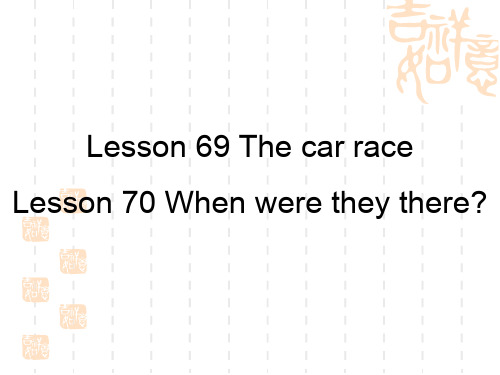
give gave Tom gives me a bag . Tom gave me a bag yesterday . Tom did not give me a bag yesterday .
Tom didn’t give me a bag yesterday . Did Tom give you a bag yesterday ?
Penny and me were at school on February 2nd. Sam and Tom were in India in 1990.
on in
at
on
in
in
to
at
on in
He didn’t say to me. Did he say to you?
there, too. You can see us in the crowd. We are
standing on the left. There were twenty cars in
the race. There were English cars, French cars,
German cars, Italian cars, American cars and
行为动词的过去式有规则变化和不规则变化两种,规 则变化有以下几种情况:
(1)直接在动词原形末尾加-ed. work-----worked; ask------asked; ( 2)以e结尾的动词只加-d. arrive-----arrived; like-----liked. (3)末尾只有一个辅音字母的重读闭音节,应先双写
口诀:"动词变成过去式,双写规律要牢记;y前 若是辅音字,y变i加-ed;y前若是元音字,只须 直接加-ed.""一般过去时态里,过去形式莫忘 记".
新概念英语第一册Lesson71~76自学笔记精讲解析

新概念英语第一册Lesson71~76自学笔记精讲解析新概念英语第一册Lesson71~72自学笔记精讲解析1.What’s Ron Marston like, Pauline? 波琳,朗·马斯顿是怎样一个人?What is sb. like? 这一句式可用来询问某人的外貌或品行。
就本课的具体情况而言,波琳的回答更多地是指马斯顿的品行如何。
2.He telephoned me four times yesterday…他昨天给我打了4次电话……four times, 4次。
time在英语中作不可数名词时表示“时间”;作可数名词时表示“次数”。
请注意英语中次数的表示法:once 1次twice 两次three times 3次3次或3次以上通常都用基数词+ times表示:five times 5次thirty times 30次3.the day before yesterday,前天。
4.answer the telephone,接电话。
口语中也常用 answer the phone。
类似的短语如:answer the door/doorbell应声开门answer a letter回信5.She can’t speak to you now! 她现在不能同你讲话!speak to sb. 意为“与某人说话”。
例如打电话时可以说:May I speak to Pauline, please? 请让波琳接电话好吗?I’ d like to speak to Pauline, please. 我想请波琳听电话。
6.This is Pauline’s mother.我是波琳的母亲。
This is…是英美人打电话时表示“我是……”的句式,而不说I’m…。
相关的电话用语如:This is Mary speaking. 我是玛丽。
This is Edward calling from London. 我是爱德华,现正在伦敦给你打电话。
- 1、下载文档前请自行甄别文档内容的完整性,平台不提供额外的编辑、内容补充、找答案等附加服务。
- 2、"仅部分预览"的文档,不可在线预览部分如存在完整性等问题,可反馈申请退款(可完整预览的文档不适用该条件!)。
- 3、如文档侵犯您的权益,请联系客服反馈,我们会尽快为您处理(人工客服工作时间:9:00-18:30)。
Do you like to call/ telephone your friend? How often do you giveห้องสมุดไป่ตู้him/her a call?
Read and answer Questions
• 1.How many times did Ron Marston telephone Pauline?
• telephone again no
Retell the passage . Come on !
SUM UP
• like awful four three
Retell the story
say typing can't
• office boss answered speak
• Then arrived again didn't answer • last night nine o'clock mother
Marston?
listen and retell
• 听录音,标注语调; • 跟读录音; • 有感情的朗读对话,注意语音语调。
• • • • • • • • • • • • • • • •
JANE : What's Ron Marston like, Pauline? PAULINE: He's awful! He telephoned me four times Yesterday, and three times the day before yesterday. He telephoned the office yesterday morning and yesterday afternoon. My boss answered the telephone. JANE : What did your boss say to him? PAULINE: He said, ‘Pauline is typing letters. She can't speak to you now!’ PAULINE: Then I arrived home at six o'clock yesterday evening. He telephoned again. But I didn't answer the phone! JANE : Did he telephone again last night? PAULINE: Yes, he did. He telephoned at nine o'clock. JANE : What did you say to him? PAULINE: I said, 'This is Pauline's mother. Please don't telephone my daughter again!' JANE : Did he telephone again?
Seven times
• 2.Who answered the phone yesterday afternoon ?
Pauline’s boss
• 3.What did her boss say to Ron Marston?
Pauline is typing letters. She can’t speak to you now . • 4. Did Pauline’s mother say to Ron
• • • • • • • • • • • • • • • • •
完形填空思维训练之二:动词训练 JANE : What's Ron Marston like, Pauline? PAULINE: He's awful! He _____ me four times yesterday, and three times the day before yesterday. He _____ the office yesterday morning and yesterday afternoon. My boss _____ the telephone JANE : What _____ your boss _____ to him? PAULINE: He _____, "Pauline _____ _____ letters. She can’t _____ to you now!" Then I _____ home at six o'clock yesterday evening. He _____ again. But I _____ _____ the phone! JANE : _____ he _____ again last night? PAULINE: Yes, he _____. He _____ at nine o'clock. JANE : What _____ you _____ to him? PAULINE: I _____, 'This _____ Pauline's mother. Please _____ _____ my daughter again!' JANE : _____ he _____ again?
• • • • • • • • • • • • • • • • •
完形填空思维训练之一:生词和介词训练 JANE : What's Ron Marston _____, Pauline? PAULINE: He's _____! He _____ me four times yesterday, and three _____ the day before yesterday. He _____ the office yesterday morning and yesterday afternoon. My boss _____ the telephone JANE : What did your boss _____ to him? PAULINE: He _____, "Pauline is typing typing letters. She can’t speak _____ you now!"Then I arrived home _____ six o'clock yesterday evening. He _____ again. But I didn't _____ the phone! JANE : Did he _____ _____ last night? PAULINE: Yes, he did. He _____ at nine o'clock. JANE : What did you _____ to him? PAULINE: I said, 'This is Pauline's mother. Please don't ____ my daughter _____!' JANE : Did he _____ again?
